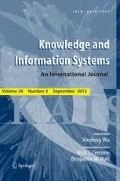Abstract
The Ant Trail problem has been widely investigated as a benchmark for automatic design of algorithms. One must design the program of a virtual ant to collect all pieces of food located in different places of a map, which may have obstacles, in a predefined limit of steps. This is a challenging problem, but several evolutionary computation (EC) researchers have reported methods with good results. In this paper, we propose an EC method called \({\lambda }\)-linear genetic programming (\({\lambda }\)-LGP), a variation of the well-known linear genetic programming (LGP) algorithm. Starting with an LGP based only on effective macro- and micro-mutations, the \({\lambda }\)-LGP proposed in this work consists in extending how the individuals are chosen for reproduction. In this model, a number (\({\lambda }\)) of mutations is applied to each individual, trying to explore its neighboring fitness regions; such individual might be replaced by one of its children according to different criteria. Several configurations were tested over three different trails: the Santa Fe, the Los Altos Hill, and the John Muir. Results show a very significant improvement over LGP by using this proposed variation. Also, \({\lambda }\)-LGP outperformed not only LGP, but also other state-of-the-art methods from the literature.









Similar content being viewed by others
References
Brameier M, Banzhaf W (2001) Effective linear genetic programming. Tech. rep., University of Dortmund, Germany
Brameier MF, Banzhaf W (2007) Linear genetic programming. Springer, Berlin
Canillas JM, Sanchez R, Baran B (2009) Estimation models generation using linear genetic programming. CLEI Electron J 12(3):1–8
Chellapilla K, Czarnecki D (1999) A preliminary investigation into evolving modular finite state machines. In: Proceedings of the 1999 Congress on evolutionary computation, 1999. CEC 99, vol. 2, p 1356
Doucette J, Heywood MI (2010) Novelty-based fitness: an evaluation under the santa fe trail. In: Genetic programming. Springer, Berlin, pp 50–61
Fogelberg C (2005) Linear genetic programming for multi-class classification problems. BSc (Honours) Research Project Report, School of Mathematics, Statistics and Computer Science, Victoria University of Wellington, New Zealand
Georgiou L, Teahan WJ (2011) Constituent grammatical evolution. In: IJCAI Proceedings-International Joint Conference on Artificial Intelligence, vol. 22, pp 1261–1268
Guven A (2009) Linear genetic programming for time series modelling of daily flow rate. J Earth Syst Sci 118:137–146
Hugosson J, Hemberg E, Brabazon A, ONeill M (2010) Genotype representations in grammatical evolution. Appl Soft Comput 10(1):36–43
Jefferson D, Collins R, Cooper C, Dyer M, Flowers M, Korf R, Taylor C, Wanq A (1990) Evolution as a theme in artificial life: the genesys/tracker system. Computer Science Department, University of California
Karim MR, Ryan C (2012) Sensitive ants are sensible ants. In: Proceedings of the 14th annual conference on genetic and evolutionary computation, GECCO ’12. ACM, New York, NY, USA, pp 775–782
Koza JR (1992) Genetic programming: on the programming of computers by means of natural selection. MIT Press, Cambridge
Langdon WB, Poli R (1998) Why ants are hard. In: University of Wisconsin. Morgan Kaufmann, pp 193–201
Lehman J, Stanley KO (2010) Efficiently evolving programs through the search for novelty. In: Proceedings of the 12th annual conference on genetic and evolutionary computation., GECCO ’10. ACM, New York, NY, USA, pp 837–844
Luke S (2010) The ECJ owner’s manual —a user manual for the ECJ Evolutionary Computation Library, zeroth edition, online version 0.2 edn
Miller JF, Thomson P (2000) Cartesian genetic programming. In: Genetic programming. Springer, pp 121–132
O’Neill M, Brabazon A (2006) Grammatical swarm: the generation of programs by social programming. Nat Comput 5(4):443–462
O’Neill M, Vanneschi L, Gustafson S, Banzhaf W (2010) Open issues in genetic programming. Genet Program Evolvable Mach 11(3–4):339–363
Sotto LFDP, de Melo VV (2014) Comparison of linear genetic programming variants for symbolic regression. In: Proceedings of the 2014 conference companion on genetic and evolutionary computation companion. ACM, pp 135–136
Sotto LFDP, de Melo VV (2014) Investigation of linear genetic programming techniques for symbolic regression. In: 2014 Brazilian Conference on Intelligent Systems (BRACIS). IEEE, pp 146–151
Sotto LFDP, de Melo VV (2016) Studying bloat control and maintenance of effective code in linear genetic programming for symbolic regression. Neurocomputing 180:79–93
Swafford JM, Hemberg E, O’Neill M, Nicolau M, Brabazon A (2011) A non-destructive grammar modification approach to modularity in grammatical evolution. In: Proceedings of the 13th annual conference on genetic and evolutionary computation, GECCO ’11. ACM, New York, NY, USA, pp 1411–1418
Acknowledgements
The authors would like to thank Coordenação de Aperfeiçoamento de Pessoal de Nível Superior (CAPES) (Science without Borders) Grant (12180-13-0) and Conselho Nacional de Desenvolvimento Científico e Tecnológico (CNPq) (Universal) Grant (486950/2013-1) to V.V.M and (477243/2013-4) to M.P.B, and Fundação de Amparo à Pesquisa do Estado de São Paulo (FAPESP) Grants (2013/20606-0) and (2016/07095-5) to L.F.D.P.S.
Author information
Authors and Affiliations
Corresponding author
Rights and permissions
About this article
Cite this article
Sotto, L.F.D.P., de Melo, V.V. & Basgalupp, M.P. \({\lambda }\)-LGP: an improved version of linear genetic programming evaluated in the Ant Trail problem. Knowl Inf Syst 52, 445–465 (2017). https://doi.org/10.1007/s10115-016-1016-y
Received:
Revised:
Accepted:
Published:
Issue Date:
DOI: https://doi.org/10.1007/s10115-016-1016-y




